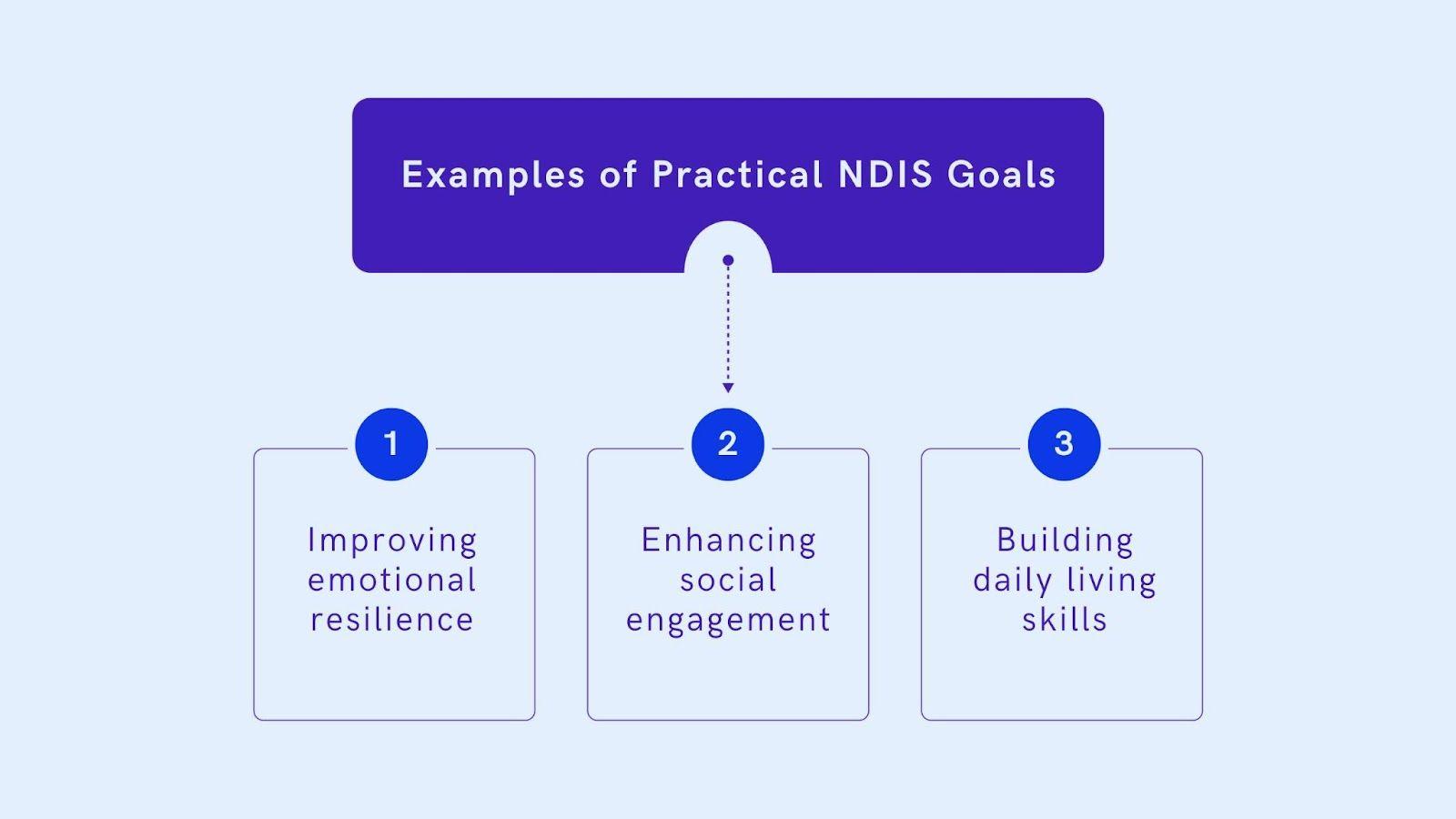
13 March 2025
NDIS: How Mental Health Professionals Can Help Clients Set the Perfect Goals
Understanding NDIS (National Disability Insurance Scheme) goals is essential for maximising the benefits of a plan and achieving meaningful outcomes. The NDIS isn’t just about receiving services; it’s about setting clear, achievable goals that improve quality of life.
Mental health professionals like you will play a pivotal role in this process, assisting your clients in identifying and articulating goals that align with their needs and aspirations. You can also critically guide your patients so that they meet the necessary criteria to access funding and support.
The Role of Mental Health Experts in NDIS Goal-Setting

Mental health professionals navigate the goal-setting process by providing invaluable support to clients. They use their expertise to ensure that the goals are:
- Outcome-focused: Clients should achieve results rather than require certain services that meet their goals. For instance, frame a goal as ‘improving emotional resilience through targeted therapeutic support using distress tolerance and emotion-focused therapy instead of having clients request therapy sessions.
- Aligned with the NDIS framework: Mental health professionals can guide clients in drafting goals that align with NDIS parameters, potentially making it easier to connect funding to desired outcomes.
- Realistic and actionable: Through assessments and ongoing discussions, Mental health professionals guide clients to set and achieve ambitious but realistic goals. Their involvement balances aspiration with practicality.
Strategies for Helping Your Clients Set Effective NDIS Goals
To support your clients in setting practical NDIS goals, you can follow these strategies:
1. Identify Outcome-Focused Goals
- Start with strengths and aspirations: Discuss the client’s long-term dreams and immediate priorities. Focus on how the client's strengths can contribute to achieving these aspirations. Use therapeutic tools to explore the client's personal and social values.
- Frame goals around outcomes: Define goals in terms of results instead of focusing on specific services. For example, a goal might be to "enhance social engagement through regular community participation" rather than simply "attend social events."
- Link goals to independence: Highlight areas where clients want to build self-reliance, such as managing daily tasks or developing coping strategies for mental health challenges. This approach helps clients envision a path toward self-sufficiency.
2. Prepare for NDIS Planning Meetings
- Clarify goals with clients: Collaborate to clearly define and write goals in a language aligning with NDIS terminology, such as “capacity building” or “social participation.” You can provide examples of how these terms can be applied to their unique situations.
- Provide documentation: Offer well-organized notes or reports detailing the client’s goals, strengths, and needs. These notes or reports can support clients during planning meetings by clearly outlining their needs and goals.
- Practice discussions: Role-play planning meetings with clients to help them confidently communicate their goals and justify how these align with their funding requirements. Simulating potential questions and scenarios can alleviate anxiety and build confidence.
Key Considerations for Setting NDIS Goals
When guiding clients, it’s important to keep the following in mind:
- Short-term goals: Focus on achievable milestones within a year, such as "improving daily task management with minimal support." These should be specific and provide immediate motivation.
- Long-term goals: Address broader aspirations, like "achieving independent living within five years." These goals should inspire and provide a roadmap for sustained efforts.
How Would You Balance Short-Term and Long-Term Goals?
Balancing short-term and long-term goals involves strategic prioritisation and integrating practical skills that support meaningful progress and independence. Here’s what you need to know.
- Prioritise Quality Over Quantity: Encourage clients to focus on a few high-impact goals rather than an extensive list. Quality goals are more likely to attract appropriate funding and lead to meaningful progress. Mental health professionals can guide clients in prioritising what matters most.
- Incorporate Everyday Life Skills: Integrating goals that build practical skills can significantly impact a client’s independence and confidence. For example, managing finances, improving communication, or developing healthier coping mechanisms. These skills often serve as the foundation for achieving broader aspirations.
Examples of Practical NDIS Goals

Here are a few examples of goals that mental health professionals can help their clients set:
- Improving emotional resilience: Engage in weekly therapy sessions aimed at managing anxiety and building coping skills. Document progress with measurable outcomes, such as reduced anxiety episodes.
- Enhancing social engagement: Join a local group or participate in a weekly activity to build relationships and reduce isolation. Track participation rates and feedback to measure success.
- Building daily living skills: Learn to prepare meals or manage a household budget independently. These goals can be broken down into smaller, actionable steps to track gradual progress.
Linking Goals to NDIS Funding
Their involvement balances aspiration with practicality. Mental health professionals can assist clients by:
- Mapping goals to funding categories: For example, mental health professionals can suggest linking mobility improvement goals with requests for physiotherapy, which NDIA plan delegates may then evaluate. Provide detailed justifications for the connection.
- Documenting the need for specific supports: Provide detailed explanations of how clients will achieve a goal directly through support or service delivery. Use clear and concise language to communicate each support's value.
- Tracking progress: Review goals and outcomes regularly to ensure that funding continues to align with evolving needs. Provide updates during review meetings to demonstrate progress and advocate for necessary adjustments.
Overcoming Common Challenges
Overcoming common challenges in goal-setting ensures a smoother and more effective journey for clients under the NDIS framework. Let’s find out how.
- Vague or Unrealistic Goals: Use SMART criteria (Specific, Measurable, Achievable, Relevant, Time-bound) to refine and ensure goals remain realistic. Revise overly broad or unattainable objectives in collaboration with clients.
- Clients Feel Overwhelmed: Break down long-term goals into smaller, manageable steps. Celebrate progress to maintain motivation. Mental health professionals can also use therapeutic techniques to reduce stress and anxiety related to goal-setting.
- Difficulty Aligning Goals with Funding: Consult with NDIS coordinators or planning partners to ensure that you appropriately link goals to available funding categories. Hence, collaborating with NDIS plan management providers or legal experts is recommended for detailed navigation of technical NDIS requirements.
Additional Tips for Success
- Stay Updated: Mental health professionals should remain informed about NDIS policy changes to provide the most accurate guidance.
- Encourage Advocacy: Enable clients to advocate for their needs during NDIS meetings.
- Monitor Progress: Regular check-ins ensure that goals remain relevant and necessary adjustments occur.
By taking these steps, mental health professionals can help their clients unlock the full potential of their NDIS plans, leading to lasting improvements in their quality of life.
Frequently Asked Questions (FAQs)
1. What happens if my NDIS goals change after my plan is approved?
NDIS plans can be adjusted if your goals change. During your plan review, you can request to update your goals and the supports that align with them. It's important to communicate with your NDIS planner or support coordinator about any changes in your circumstances or aspirations to ensure your plan remains relevant.
2. How do I ensure my goals are measurable and trackable?
To make your goals measurable, break them down into specific, achievable steps with clear outcomes. Use metrics such as timeframes, frequency of activities, or particular skills to track progress. For example, instead of a goal to "improve mobility," a more measurable goal could be "walk independently for 15 minutes a day, 3 times a week."
2. Can I include family or carers in goal setting?
Yes, involving family or carers in goal-setting can be very helpful. They can provide valuable insights into your daily life and challenges, helping to ensure that goals reflect your actual needs. However, the goals should always be centred on what the participant wants to achieve, with family support being a guiding resource.
3. How do I know if my NDIS goals are realistic and achievable?
To assess if your goals are realistic, consider your current skills, resources, and supports available. It helps to set goals that are challenging but achievable. Consulting with service providers or support coordinators can provide valuable input in determining the right balance between ambition and feasibility.
4. Can I include goals that focus on health or medical treatments?
Yes, health-related goals can be part of your NDIS plan, mainly if they contribute to building independence or improving quality of life. However, keep in mind that NDIS funding typically focuses on supports that help participants achieve greater independence in daily life, so health or medical goals should be framed around personal outcomes like improved mobility or managing a condition independently.
5. What should I do if I’m not making progress toward my goals?
If you’re struggling to make progress, it’s important to review your goals and the support you're receiving. Consider whether your goals are realistic or need adjustment. You may also need to increase the frequency of services or seek additional support. Regular check-ins with your NDIS planner or support coordinator can help identify any barriers and adjust your plan.
Conclusion
Mental health professionals play a critical role in helping clients navigate the NDIS goal-setting process. By focusing on outcome-based goals, preparing clients for planning meetings, and linking goals to funding, they ensure that clients can access the support they need to achieve meaningful progress.
Platforms like PractaLuma provide seamless integration and intuitive documentation tools, making it easier for you and your patients to craft tailored NDIS goals. Learn more about PractaLuma here.